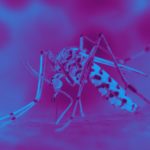Lien vers Pubmed [PMID] – 28750669
Malar. J. 2017 07;16(1):301
BACKGROUND: Malaria is ranked as the leading communicable disease in Ethiopia, where Plasmodium falciparum and Plasmodium vivax are co-endemic. The incidence of P. vivax is usually considered to be less seasonal than P. falciparum. Clinical cases of symptomatic P. falciparum exhibit notable seasonal variation, driven by rainfall-dependent variation in the abundance of Anopheles mosquitoes. A similar peak of clinical cases of P. vivax is usually observed during the rainy season. However, the ability of P. vivax to relapse causing new blood-stage infections weeks to months after an infectious mosquito bite can lead to substantial differences in seasonal patterns of clinical cases. These cannot be detected with currently available diagnostic tools and are not cleared upon treatment with routinely administered anti-malarial drugs.
METHODS: A health- facility based cross-sectional study was conducted in Adama malaria diagnostic centre from May 2015 to April 2016. Finger-prick blood samples were collected for thin and thick blood film preparation from participants seeking treatment for suspected cases of febrile malaria. Informed consent was obtained from each study participant or their guardians. Seasonal patterns in malaria cases were analysed using statistical models, identifying the peaks in cases, and the seasonally varying proportion of P. vivax cases attributable to relapses.
RESULTS: The proportion of patients with malaria detectable by light microscopy was 36.1% (1141/3161) of which P. vivax, P. falciparum, and mixed infections accounted for 71.4, 25.8 and 2.8%, respectively. Of the febrile patients diagnosed, 2134 (67.5%) were males and 1919 (60.7%) were urban residents. The model identified a primary peak in P. falciparum and P. vivax cases from August to October, as well as a secondary peak of P. vivax cases from February to April attributable to cases arising from relapses. During the secondary peak of P. vivax cases approximately 77% (95% CrI 68, 84%) of cases are estimated to be attributable to relapses. During the primary peak from August to October, approximately 40% (95% CrI 29, 57%) of cases are estimated to be attributable to relapses.
DISCUSSION: It is not possible to diagnose whether a P. vivax case has been caused by blood-stage infection from a mosquito bite or a relapse. However, differences in seasonal patterns of P. falciparum and P. vivax cases can be used to estimate the population-level proportion of P. vivax cases attributable to relapses. These observations have important implications for the epidemiological assessment of vivax malaria, and initiating therapy that is effective against both blood stages and relapses.

